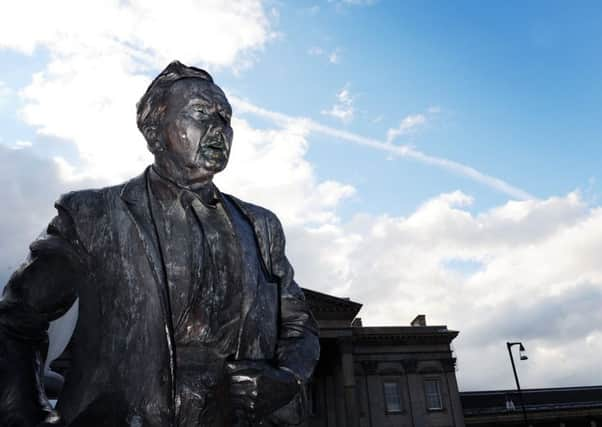Alan Johnson: My hero Harold Wilson was a reluctant European, but no isolationist


More homes were built than at any other time in our history, including 425,000 in 1968 alone. The 1968 Clean Air Act; the Race Relations Act; equal opportunities for women, de-criminalising homosexuality and legalising abortion; the abolition of the death penalty.
Wilson gets too little credit for the changes he presided over. For instance, Roy Jenkins is often portrayed as pursuing the policies of those “liberal-minded Gaitskellites” as Home Secretary as if it was something he did without Cabinet approval.
Advertisement
Hide AdAdvertisement
Hide AdBut it was Wilson who appointed Jenkins to the Home Office and Wilson who would have had to approve the legislative changes that his Home Secretary introduced.
To me as a teenager in the 1960s, I felt instinctively what my colleague, the historian Tristram Hunt, describes as the “profound cultural, social and moral modernisation of Britain”.
Harold Wilson even brought the voting age down from 21 to 18, allowing me to cast my first vote for Labour in the 1970 election.
Despite my support it was the Conservatives who won under the leadership of Edward Heath who was determined to lead Britain into what was then the European Economic Community.
Advertisement
Hide AdAdvertisement
Hide AdI doubt if Wilson was a reluctant social reformer simply carried along by events. He was, however, a reluctant European.
His personal preference was for a new emphasis on and an expansion of trade with the Commonwealth. He had since his youth been attached to the old dominions and an internationalist interest in the Third World, as it was called, was acquired at Oxford. He shared Attlee’s pride in the notion of transforming the Empire into the Commonwealth and saw it not as a sentimental association or even just a trading area but as a multi-racial community and potential force in the world, one in which Britain had a moral as well as practical obligation to act as guide and advocate.
He felt that entry into Europe would mean sacrificing much of that Commonwealth opportunity, that it would tie the hands of a Labour administration and reduce its ability to regulate the domestic economy.
There are those who mistakenly believe that they voted to join a Common Market and no more. But if those people were around in 1975 their memory is faulty.
Advertisement
Hide AdAdvertisement
Hide AdWilson said this to the House of Commons as Prime Minister as early as 1967: “Whatever the economic arguments, as I have repeatedly made clear, the Government’s purpose derives above all from our recognition that Europe is now faced with the opportunity of a great move forward in political unity and that we can – and indeed must – play our full part in it.”
Eight years later the debate was about creating a European Parliament and the recognition that for the Market to work properly the decisions made by its political leaders had to be properly enforceable and that the Community must have shared values of free speech, democracy and the rule of law.
Britain voted for Wilson‘s “great move forward”, and in 1975, as a postman raising three children on a council estate, I voted ‘yes’ for my children’s future.
In the ensuing 41 years I’ve never regretted that decision, not just for the peace and prosperity that European unity has preserved amongst its original members but because of its crucial role in introducing its basic values to the countries that were in 1975 under military dictatorship in the South and totalitarian rule in the East.
Advertisement
Hide AdAdvertisement
Hide AdWilson was certainly, as Tony Benn said, “the cleverest political leader”, but I also believe that he was honest in his efforts to bring closure to this contentious issue by allowing the people to decide.
Henry Kissinger pointed out that Wilson had performed a double service. “By committing the Labour Party to the principle of entry in 1967 he had ensured that the question of enlargement stayed on the EEC agenda; and he had made the pursuit of entry by whoever was in power in the early 1970s (it happened to be the Tories) much less daunting.”
“Now,” Kissinger said in 1975, “he had made sure that such participation would be permanent.” Or so we thought until the ructions inside the Conservative Party led to us re-live our history with another June referendum on whether we remain or leave the European Union. The parallels between then and now are remarkable – a party divided, a leader who felt the only way out of the predicament was to commit to a referendum following a re-negotiation. A Cabinet allowed to escape collective responsibility and a Government recommendation to remain.
I’m pretty sure I know which way Harold Wilson would have voted. He may have been a reluctant European but he was never a narrow nationalist and he would never have taken his country into off-shore isolation.
Alan Johnson is the Hull West and Hessle MP who is delivering the Harold Wilson Lecture tonight to Huddersfield Literature Festival. This is an edited version.